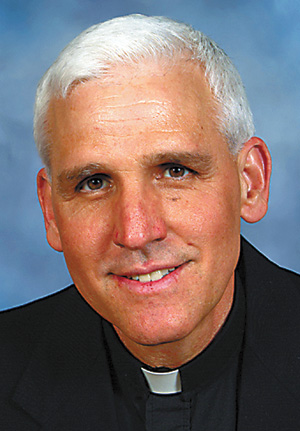By Father Bill Kneemiller
Guest Opinion

In September 1968, Padre Pio, one of the most well-known saints in the 20th century, wrote Pope Paul VI a letter expressing his unconditional support for the pope’s newly written encyclical “Humanae Vitae.” This encyclical has often been reduced to a simple statement that the Church teaches against birth control. Padre Pio, in contrast, wrote that this is a “high teaching … assisted by the Holy Spirit in the name of God.” Padre Pio wrote to comfort Paul VI who suffered greatly because of Catholics who disobeyed or disregarded this teaching.
In light of Bishop Martin Amos’ recent letter addressing the critical issue of the U.S. Department of Health and Human Services’ mandate for all employers to provide coverage for sterilization, contraception and some drugs that may cause abortion, I re-read Humanae Vitae. Paul VI’s focus in the encyclical is on God’s loving design, and on the nobility of marriage, described as a “union of two persons in which they perfect one another.” Married love is described as a love which is a “compound of sense and spirit.” This union is a love that is total, a sharing of everything that is honorable and meritorious.
Paul VI also describes married love in mystical and liturgical language. “Marriage and conjugal love are by their nature ordained toward the procreation and education of children. As such, married couples are to be the “ministers of the design established by the Creator.” This is fitting preparation for his discussion on the sacredness of human life, as Paul VI adds that any true act of love reverences God as the source of life. In contrast, one of the most stunning statements in this encyclical is that a man using contraceptive methods “may forget the reverence due to a woman … and reduce her to being a mere instrument … and no longer surround her with care and affection.” As I read these words, I think of a tender father, as Paul VI addresses all these concerns to his “sons and daughters.”
The next section on “Recourse to Infertile Periods” states that couples may have a legitimate desire to space children, and the development of Natural Family Planning fits well in this consideration. The pope had no illusions that this teaching is an easy one, as he compares this journey to holiness with the Gospel parable of passing through the narrow gate, and the way that leads to life is hard.
Next, Paul VI gives a sweeping vision of a future where artificial birth control influences the entire culture. First, this will open wide the way of marital infidelity, and a general lowering of moral standards. Young people will be under greater temptations. Paul VI predicted that if couples adopt contraception, then public authorities will favor these methods that are most effective.
The next statement in “Consequence of Artificial Methods” is an amazing description of what is currently happening with the mandates of the U.S. Department of Health and Human Services: “Should they (public authorities) regard this as necessary, they may even impose their use on everyone.” The pope adds, when people are determined to avoid the divine law they may “give into the hand of public authorities the power to intervene in the most personal and intimate responsibility of husband and wife.”
In his concluding appeal to public authorities, Paul VI echoes the call of more than 160 bishops who are speaking out against the federal mandate: “Do not tolerate any legislation which would introduce into the family those practices which are opposed to the natural law of God.”
Conclusion: I have long believed that Humanae Vitae came from the heart of Paul VI as an inspiration of the Holy Spirit. As of about 80 years ago, nearly every Christian denomination taught against birth control; now it’s safe to say only a few have continued this teaching. I also believe that in the past 40 years our culture has gone through a major moral shift. Paul’s VI’s predictions are mystical and prophetic.
Humanae Vitae may not explain all of our current woes, but it does speak to the most profound and tender of all relationships, a man and woman’s generation of new life. If the generation of human life is not taught and uplifted as a sacred act, we lose a fundamental reverence, tenderness and respect for one another. We need the vision of a tender Father, a Papa, to lead us spiritually and morally, for as we reaffirm the sacredness of life, we reveal the very dignity of our humanity.
(Father Bill Kneemiller is pastor of St. Joseph Parish in Hills and St. Mary parishes in Lone Tree and Nichols.)







